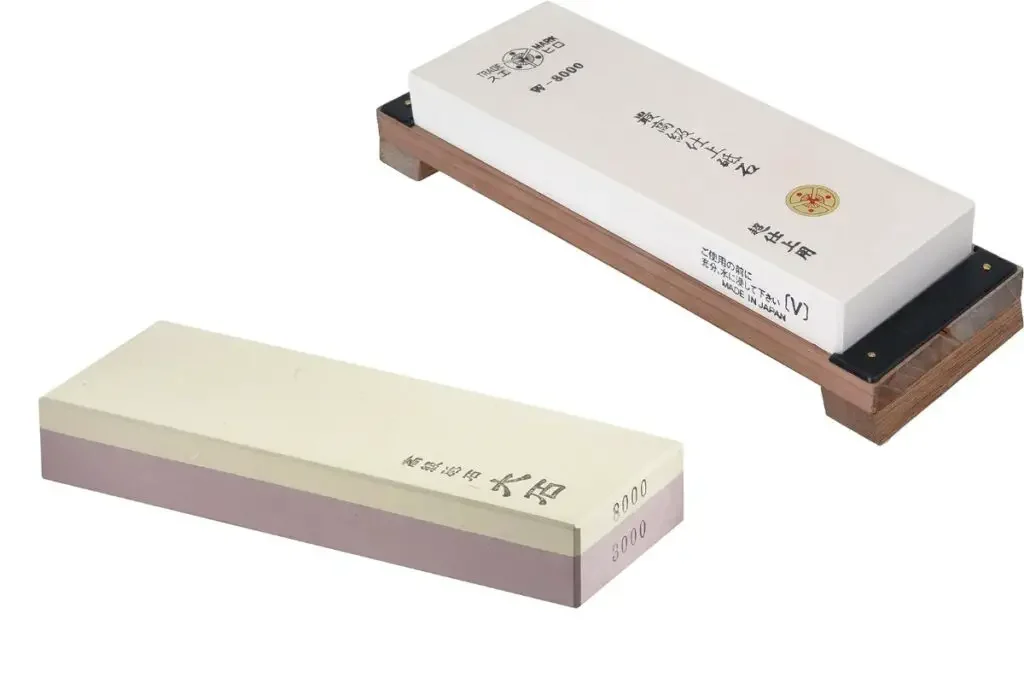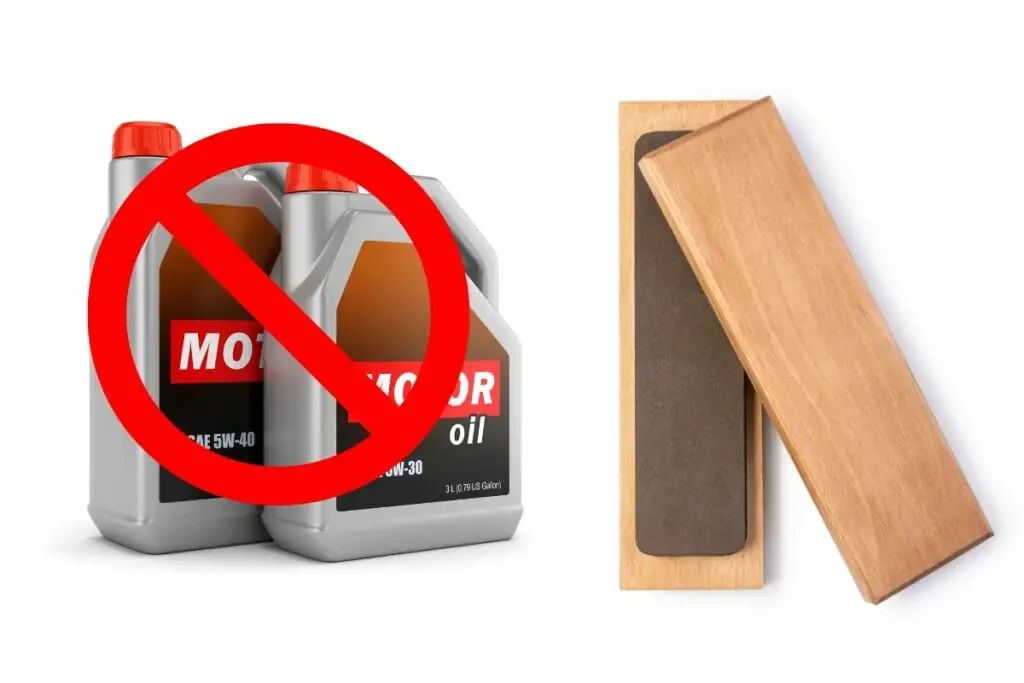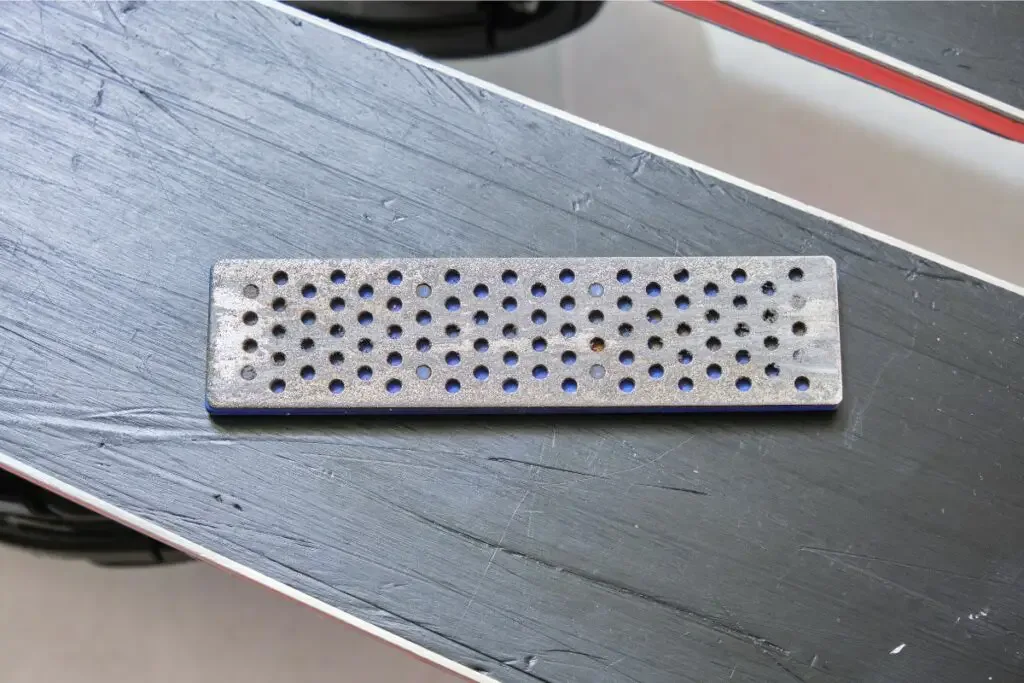As an Amazon Associate, we earn from qualifying purchases with no additional costs for you.
Using a lubricant with a whetstone is a topic that receives much debate in the knife industry, firstly which stones require a lubricant, and secondly, which lubricant is best. This can result in much confusion about the lubrication of a whetstone and lead to some problems for you if you don’t follow a few guidelines in the lubricant issue. There are some do’s and don’ts when it comes to using lubricants on whetstones.
- Follow the instructions.
- Don’t use oil on Japanese Waterstones.
- Don’t switch lubricants.
- Use a honing oil.
- Don’t use vegetable oil.
- Don’t use motor oil.
- Don’t use oil on ceramic stones.
- Use ceramic stones dry or with water.
- Don’t use oil on diamond stones.
- Use diamond stones dry or with water.
- Use mineral oil.
- Use baby oil.
Most people develop their own sharpening techniques and preferences for sharpening knives on whetstones, but for the beginner, you may not know where to start on the lubrication on sharpening stones issue. We will present some common practices that you should follow when using lubricants on stones and some practices that you should avoid.
If you are interested in checking out the best whetstones for your knives we recommend and use, you can find them by clicking here (Amazon link).
The Do’s And Don’ts Of Lubricating Sharpening Stones

If you do a search online about lubricants on sharpening stones, you will quickly become even more confused about the choice to use lubricants and which lubricants to use on which stones.
To avoid some of this inevitable confusion, we have put together a list of some do’s and don’ts around the topic to assist you.
The biggest potential issue for beginners to knife sharpening is the risk of ruining an expensive sharpening stone by using the wrong lubricant with the stone.
While this is quite difficult to do, there are certain stones that can be damaged with the wrong lubricants, and these are generally the expensive Japanese Waterstones.
Some people have tried weird and wonderful lubricants on their stones, which may work at first but could reduce the effective life of the stone and the effective cutting ability of the stone in the long run.
Some sharpening stones can be quite pricey, so it would certainly make good sense to use the correct lubricant to extend the life of the stone for as long as possible.
Many of the topics we cover could be considered as common sense, but we list them anyway to make sure you don’t fall into the trap and use the wrong lube on your stone in error and have questionable results with your sharpening and an unhealthy sharpening stone.
Do Follow The Manufacturer’s Instructions
Most sharpening stones will come with some sort of instruction from the manufacturer regarding the use and care of the stone.
Make sure that you read the instructions before using the stone and inadvertently use the wrong lubricant on the stone.
Some sharpening stone materials will work better with oil as a lubricant, while others will work optimally with water, and others still are best used dry.
The manufacturer should give an indication on the packaging or on the instruction to insert what the best lubricant is to use with that particular stone.
It would be the best choice to follow the instructions of the manufacturer to get the best possible performance and longevity from the stone by using the recommended lubricant.
Don’t Use Oil On Japanese Waterstones

The whetstones that are designated as Japanese Waterstones are called Waterstones for a reason, so the clue as to which lubricant is best for the stone is right there in the name.
If you can afford Japanese Waterstones, you would certainly want to take the best care possible of these sharpening stones! These stones are considered by many to be the highest standard in sharpening stones, and as such, they are very costly indeed!
Japanese Waterstones are natural rocks that are quarried from a certain area in Japan. Due to the nature of the rock that the stones are made from, the only acceptable lubricant to use on them is water.
Using oil on these stones will clog them up, and if the oil penetrates deeply enough into the stone, you will not be able to remove the oil, and the stone will be ruined.
Don’t Switch Lubricants On A Stone
Some modern commercially available sharpening stones will give you a choice whether you want to use water or oil as a lubricant for the stone.
This is because the material that the stone is made from will work equally well with oil or with water as the lubricant.
However, once you have chosen to use water on the stone, you will not be able to switch to using oil. Likewise, if you start using oil in the stone, you will not be able to switch to water as the lubricant on the stone at a later date.
Once you have chosen one of the lubricants, you will need to stick with that lubricant for the life of the stone.
Most people know that oil and water do not mix, and the lubricant that you choose will penetrate deep into the stone. Switching lubricants with incompatible substances will make the stone less effective from a cutting perspective and will create a mess. It could possibly ruin the stones to the point that you need to discard them and purchase new ones.
Do Use A Honing Oil
There are oils that are specially formulated for the purpose of sharpening knives and tools on whetstones. These oils are termed honing oils and are of a specific viscosity and composition to make them ideal for sharpening.
The viscosity will be enough to lift the swarf from the stone and prevent clogging, but not so thin that it simply runs off the stone.
Many sharpening stone manufacturers ship a honing oil with their stones that they recommend as the optimal lubricant to use on their stones.
If you start using this lubricant, it’s best to stick to this oil for use on your stone rather than switching to oil with different composition or viscosity.
Don’t Use Vegetable Oil
Any plant-based oil is a definite DON’T to use on your sharpening stone. This is probably one of the biggest mistakes that many people new to knife sharpening make with their stones.
Plant-based oils such as sunflower oil, olive oil, linseed oil, coconut oil, avocado oil, and similar oils may seem like a logical alternative because they will lubricate the stone, and these oils are not overly viscous.
There are a couple of problems with using these plant-based oils on your sharpening stone. Some of these oils will be liquid in warmer temperatures, but in cooler conditions, such as the wither time, they solidify. This will clog up the stone and render it useless!
Even if you use an oil that does not solidify, such as olive oil, the plant-based oils tend to go rancid after a short period of time.
Vegetable oil that has soaked into your stone and gone rancid will produce a smell that is unbearable, and you would rather throw the stone away than continue to use it.
Some vegetable oils start to break down over time and become very sticky and tacky, almost like tar, which will clog up your stone and render it unusable.
TIP: Do you know if whetstones need to be soaked before using? Check out the complete guide about soaking whetstones in the article below:
Do Sharpening Stones Need To Be Wet? Complete Breakdown
Don’t Use Motor Oil To Lubricate Your Sharpening Stones

Motor oil is another lubricant that readily comes to mind when people are considering alternative oils to use on their sharpening stones.
Motor oils are generally too viscous to be suitable as a lubricant on a sharpening stone, and they will not effectively carry the swarf away from the surface of the stone.
Due to the viscosity of the oil, it also attracts contaminants such as dust to the surface of the oil, which then forms a sticky residue on the stone.
Dirty motor oil is also not recommended, as this will simply introduce additional small pieces of metal to the surface of the stone, which is what you are trying to get rid of in the first place.
The stuff that makes old motor oil black is small particles of metal that get worn away from the inside of an engine. These particles become suspended in the oil, making it appear black.
You don’t want to introduce additional metal particles to the surface of your sharpening stone. This is why it is always best to use clean oil and to wipe your stone clean after using it.
Don’t Lubricate Ceramic Stones With Oil
The nature of ceramic stones is such that they do not perform well when used with oil. The oil tends to over-lubricate these stones, and they cut less efficiently.
This results in the sharpening taking longer on ceramic stones when oil is used as a lubricant. It is, therefore, generally not advisable to use oil on ceramic stones. It will not harm the ceramic stones, but it may inhibit the cutting ability of the stone.
Do Use Ceramic Stones Dry Or With Water
Ceramic stones work really well when used dry or with water as a lubricant. The water is sufficient lubricant to lift the swarf from the stone and move it away from the cutting surface of the stone. The water can simply be wiped off after the stone has been used, and the stone will be clean.
If the ceramic stone is used dry, you will notice some build-up of the swarf on the stone. This will appear as black smudges on the surface of the stone.
Manufacturers of ceramic stones sell a cleaning device for ceramic stones that resembles a pencil eraser. You simply rub this rubber-type substance over the ceramic stone, and it removes the build-up of the swarf on the stone.
This is a simple and quick procedure and works well to clean up the surface of the stone and restore the cutting ability.
Don’t Use Oil On Diamond Stones
Most makers of diamond stones recommend that you do not use oil on diamond stones. The diamond surface is not porous, that the oil can soak in and offer any benefit to the cutting process.
The oil could, in effect, have the opposite effect and cause the blade to glide over the diamonds abrasive and reduce the cutting ability of the diamonds.
Because there is no surface on a diamond stone for the oil to soak into, it becomes a very messy activity if you try to use oil on one of these stones since most of the oil simply runs off.
TIP: A Swiss army knife is a great pocket-sized tool for any outdoor activity. To keep it great, you have to keep it sharp! In the article below you will find 6 care tips on how to keep your Victorinox knife sharp!
6 Care Tips on How To Keep A Victorinox Knife Sharp
Do Use Diamond Stones Dry Or With Water

If you want to use a lubricant on a diamond stone, the recommended lubricant is a little water. Water is sufficient to lift the swarf and keep the surface of the stone clean while you are sharpening your knife.
Some manufacturers of diamond stones warn against the use of water on their stones and recommend that you use the stones dry.
This is because the underlying metal that the diamonds are adhered to could rust if exposed to water and compromise the integrity of the stone.
Where the manufacturer warns against the use of water on the stone, it is best to refer to our point number 1, where we recommend that you follow the manufacturer’s instructions on the use of a lubricant for the stone.
It is generally acceptable for all diamond stones to be used dry without the stone loading up too quickly. The stones will load up with metal particles eventually, but they can easily be cleaned with a quick spray of Windex and a light scrub with an old toothbrush or similar nylon scrubbing brush.
Do Use Mineral Oil On Your Sharpening Stones
Mineral oil is a great alternative lubricant to use on a sharpening stone. This oil is generally food-safe, and the viscosity of the oil is light enough to be an effective lubricant as well as to remove the swarf from the surface of the stone.
Mineral oil is also fairly easily available since most drug stores or pharmacies will stock the product. It makes a great alternative to honing oil, and it is recommended as the best oil to use on your stone if you do not have specific honing oil.
Do Use Baby Oil On Your Stone
If you have run out of mineral oil while you are sharpening a knife on your oil stone, you can substitute the mineral oil with baby oil.
Baby oil is essentially mineral oil that has a scent added to it to make it smell good. As long as the baby oil does not have any other additives, it should be good to use on your sharpening stone.
TIP: Are you looking to buy a new whetstone? Check out our recommendations (we personally use the first three ones):
Our PRO choice whetstones combo (Amazon links):
- Fixing stone: Whetstone SHAPTON Ceramic KUROMAKU #320
- Sharpening stone: Suehiro CERAX soaking whetstone: Medium #1000
- Finishing stone: Whetstone SHAPTON Ceramic KUROMAKU #5000
Our budget choice (Amazon link): Sharp Pebble Extra Large Sharpening Stone Set
Don’t Be Confused By Terminology
Some beginners to knife sharpening may be confused by the terminology around sharpening stones. All sharpening stones can be included in the general term “whetstones,” but not all whetstones are wet stones.
Waterstones are sometimes called wet stones because water is used as the lubricant on the stone; thus, all water stones are whetstones, but not all whetstones are water stones. I am sure this has made things as clear as mud for you; hence a little further explanation is needed.
The term “whet” is an old English word that means to sharpen rather than to indicate that the stone is wet. Thus, oil stones, water stones, diamond stones, and ceramic stones are all classified as whetstones since their purpose is to sharpen knives and other tools.
Therefore, when you hear or read the term whetstone, don’t assume that the stone requires water as a lubricant.
A Quick Summary For Lubricating A Sharpening Stone
As a quick reference, we have summarized the main point to consider when lubricating a sharpening stone.
Can I use any type of oil to lubricate my sharpening stone? No, not all oils are suitable for lubricating sharpening stones. It’s essential to use specific oils like honing, mineral, or baby oil. Vegetable oils, motor oils, and other non-recommended oils can cause problems and even damage the stone.
How do I know which lubricant to use for my sharpening stone? The best way to determine the appropriate lubricant is to follow the manufacturer’s instructions that come with the stone. Different types of stones may require different lubricants, such as water for Japanese Waterstones or oil for certain oil stones.
Can I switch between oil and water as lubricants for the same stone? Generally, it’s not advisable to switch between oil and water on the same stone. Once you’ve chosen a lubricant, you should stick with it for the life of the stone. Switching can lead to ineffectiveness and potential damage to the stone.
Is it necessary to lubricate all types of sharpening stones? Not all sharpening stones require lubrication. Some stones, like certain ceramic and diamond stones, can be used dry or with water. It’s essential to understand the specific requirements of your stone and follow the guidelines provided by the manufacturer.
What are the risks of using the wrong lubricant on my sharpening stone? Using the wrong lubricant can lead to several issues, including reduced cutting ability, clogging of the stone, unpleasant odors, and even permanent damage to the stone. It’s crucial to use the correct lubricant to extend the life of the stone and maintain its effectiveness.
Conclusion
As you learn to use various types of sharpening stones, you will find a set of stones and a combination of lubricants or lack of lubricants that will suit your purposes the best.
Once you develop your own way of doing things, you can stick to the recipe that works for you and produces the best results.
Until you get to that point, you will be relying on advice and tips from other people. We have come up with this list of do’s and don’ts for using lubricants on sharpening stones to point you in the right direction on your knife sharpening journey and hopefully help to prevent you from making any costly mistakes with your stones!
TIP: What is the easiest knife to sharpen? A lot of people are asking this question. In the article below, you will find a list of the easiest knife steels to sharpen. Check it out!
List of The Easiest Knife Steels To Sharpen (With Examples)

